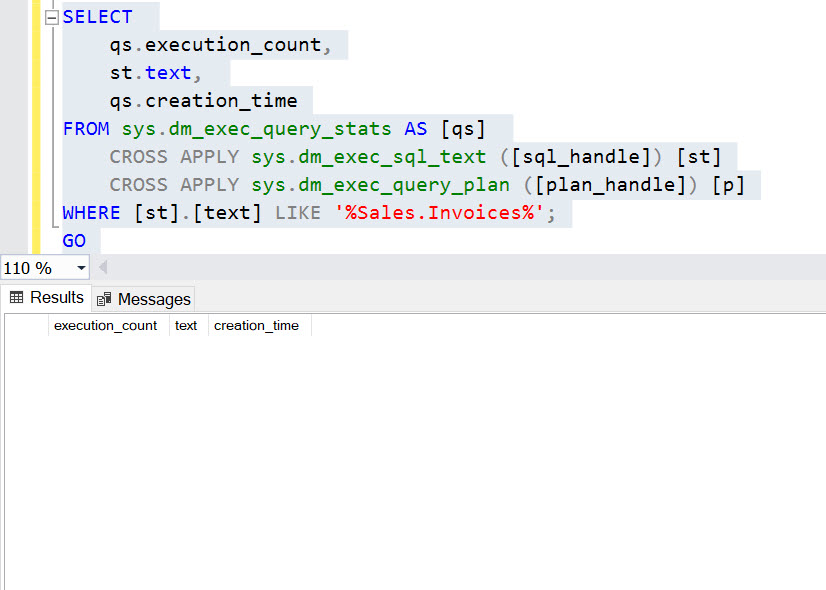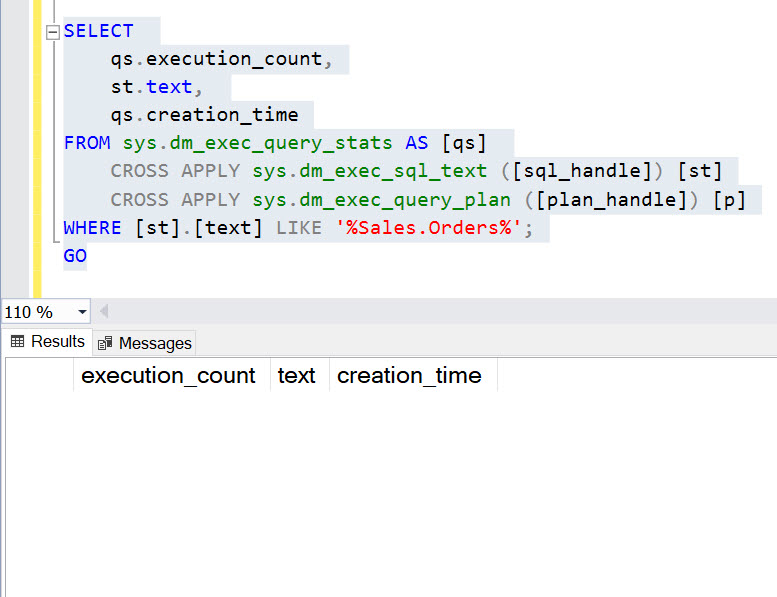Last week in our IEPTO2 class I was asked about queries with OPTION (RECOMPILE) and Query Store. Specifically: Do queries that have the OPTION (RECOMPILE) hint go into Query Store, AND do queries in a stored procedure created with the RECOMPILE option go into Query Store? I knew the answer to the first question, and was pretty sure I know the answer to the second one, but I wanted to test to verify. Let’s take a look.
TL;DR In case you’re too busy to keep reading, the answer is yes to both.
Setup
We are using the WideWorldImporters database, which you can download from Github. I’m running the latest CU for SQL Server 2017, but this is applicable for any version of Query Store (SQL Server 2016 and higher) and Azure SQL Database. The code below will enable Query Store, set QUERY_CAPTURE_MODE to ALL (to understand the different various and what’s recommended for production, check out my Query Store Settings post), and then clear out anything that’s in Query Store. I don’t typically recommend that you clear out Query Store, but we’re restoring a demo database, and this is a demo, so I want to make sure we start fresh. Lastly, we’ll create a stored procedure to use for testing that is created with RECOMPILE and then completely free procedure cache. Note that adding the RECOMPILE option to a stored procedure is not something I recommend – it means that the entire stored procedure will recompile every time it is executed. I also don’t recommend freeing procedure cache in production – this is just for demo purposes.
USE [master]; GO ALTER DATABASE [WideWorldImporters] SET QUERY_STORE = ON; GO ALTER DATABASE [WideWorldImporters] SET QUERY_STORE (OPERATION_MODE = READ_WRITE, QUERY_CAPTURE_MODE = ALL); GO ALTER DATABASE [WideWorldImporters] SET QUERY_STORE CLEAR; GO DROP PROCEDURE IF EXISTS Sales.usp_GetOrderInfo GO CREATE PROCEDURE Sales.usp_GetOrderInfo (@OrderID INT) WITH RECOMPILE AS BEGIN SELECT o.OrderID, o.CustomerID, o.OrderDate, ol.Quantity, ol.UnitPrice FROM Sales.Orders o JOIN Sales.OrderLines ol ON o.OrderID = ol.OrderID WHERE o.OrderID = @OrderID; END GO DBCC FREEPROCCACHE; GO
Testing
First, execute an ad hoc query, one that is not part of a stored procedure, that has the OPTION (RECOMIPLE) hint:
SELECT i.InvoiceID, i.CustomerID, i.InvoiceDate, il.Quantity, il.UnitPrice FROM Sales.Invoices i JOIN Sales.InvoiceLines il ON i.InvoiceID = il.InvoiceID WHERE i.InvoiceID = 54983 OPTION (RECOMPILE); GO 10
If we check the plan cache, you’ll notice that there is no evidence that this query has executed:
SELECT qs.execution_count, st.text, qs.creation_time FROM sys.dm_exec_query_stats AS [qs] CROSS APPLY sys.dm_exec_sql_text ([sql_handle]) [st] CROSS APPLY sys.dm_exec_query_plan ([plan_handle]) [p] WHERE [st].[text][/text] LIKE '%Sales.Invoices%'; GO

But if we look in Query Store we do see the query:
SELECT [qsq].[query_id], [qsp].[plan_id], [qsq].[object_id], [rs].[count_executions], [rs].[last_execution_time], [rs].[avg_duration], [rs].[avg_logical_io_reads], [qst].[query_sql_text], TRY_CONVERT(XML, [qsp].[query_plan]) AS [QueryPlan_XML], [qsp].[query_plan] FROM [sys].[query_store_query] [qsq] JOIN [sys].[query_store_query_text] [qst] ON [qsq].[query_text_id] = [qst].[query_text_id] JOIN [sys].[query_store_plan] [qsp] ON [qsq].[query_id] = [qsp].[query_id] JOIN [sys].[query_store_runtime_stats] [rs] ON [qsp].[plan_id] = [rs].[plan_id] WHERE [qst].[query_sql_text] LIKE '%Sales.Invoices%'; GO

If we expand the query_sql_text column (middle text removed for space reasons) you can see that the text includes OPTION (RECOMPILE). This is pretty cool.
![]()
Now let’s execute the stored procedure we created with RECOMPILE and then check the plan cache:
EXEC Sales.usp_GetOrderInfo 57302; GO 10 SELECT qs.execution_count, st.text, qs.creation_time FROM sys.dm_exec_query_stats AS [qs] CROSS APPLY sys.dm_exec_sql_text ([sql_handle]) [st] CROSS APPLY sys.dm_exec_query_plan ([plan_handle]) [p] WHERE [st].[text][/text] LIKE '%Sales.Orders%'; GO

And when we check Query Store we do see the query:
SELECT [qsq].[query_id], [qsp].[plan_id], [qsq].[object_id], OBJECT_NAME([qsq].[object_id]) AS ObjectName, [rs].[count_executions], [rs].[last_execution_time], [rs].[avg_duration], [rs].[avg_logical_io_reads], [qst].[query_sql_text], TRY_CONVERT(XML, [qsp].[query_plan]) AS [QueryPlan_XML], [qsp].[query_plan] /* nvarchar(max) */ FROM [sys].[query_store_query] [qsq] JOIN [sys].[query_store_query_text] [qst] ON [qsq].[query_text_id] = [qst].[query_text_id] JOIN [sys].[query_store_plan] [qsp] ON [qsq].[query_id] = [qsp].[query_id] JOIN [sys].[query_store_runtime_stats] [rs] ON [qsp].[plan_id] = [rs].[plan_id] WHERE OBJECT_NAME([qsq].[object_id]) = 'usp_GetOrderInfo'; GO
![]()
Summary
Regardless of where OPTION (RECOMPILE) is used – at the statement level for an ad hoc query or a statement within a stored procedure – and when the RECOMPILE option is used at the procedure level during creation or execution – the query text, the plan, and the execution statistics still get captured within Query Store.

3 thoughts on “Queries with OPTION (RECOMPILE) and Query Store”
This is one of the reasons I love the Query Store so much. Now we just need to have it writable on secondary replicas!